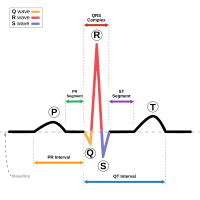
Photo from wikipedia
Objective The AliveCor KardiaBand (KB) is an Food and Drug Administration-approved smartwatch-based cardiac rhythm monitor that records a lead-Intelligent ECG (iECG). Despite the appeal of wearable integrated ECG devices, there… Click to show full abstract
Objective The AliveCor KardiaBand (KB) is an Food and Drug Administration-approved smartwatch-based cardiac rhythm monitor that records a lead-Intelligent ECG (iECG). Despite the appeal of wearable integrated ECG devices, there is a paucity of data evaluating their accuracy in diagnosing atrial fibrillation (AF). We evaluated whether a smartwatch-based device for AF detection is an accurate tool for diagnosing AF when compared with 12-lead ECG. Methods A prospective, multi-centre, validation study was conducted in an inpatient hospital setting. The KB paired with a smartwatch, generated an automated diagnosis of AF or sinus rhythm (SR). This was compared with a 12-lead ECG performed immediately after iECG tracing. Where an unclassified or no-analysis tracing was generated, repeat iECG was performed. Results 439 ECGs (iECGs (n=239) and 12-lead ECG (n=200)) were recorded in 200 patients (AF: n=38; SR: n=162) from three tertiary centres. Sensitivity and specificity using KB was 94.4% and 81.9% respectively, with a positive predictive value of 54.8% and negative predictive value of 98.4%. Agreement between 12-lead ECG and KB diagnosis was moderate when unclassified tracings were included (κ=0.60, 95% CI 0.47 to 0.72). Combining the automated device diagnosis with blinded electrophysiologists (EP) interpretation of unclassified tracings improved overall agreement (EP1: κ=0.76, 95% CI 0.65 to 0.87; EP2: κ=0.74, 95% CI 0.63 to 0.86). Conclusion The KB demonstrated moderate diagnostic accuracy when compared with a 12-lead ECG. Combining the automated device diagnosis with EP interpretation of unclassified tracings yielded improved accuracy. However, even with future improvements in automated algorithms, physician involvement will likely remain an essential component when exploring the utility of these devices for arrhythmia screening. Clinical trial registration URL: https://www.anzctr.org.au/ Unique identifier: ACTRN12616001374459.
Journal Title: Heart
Year Published: 2020
Link to full text (if available)
Share on Social Media: Sign Up to like & get
recommendations!